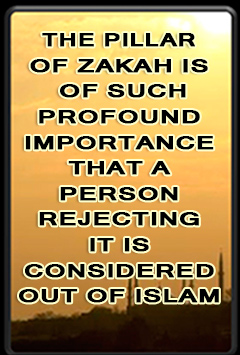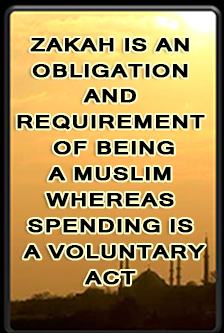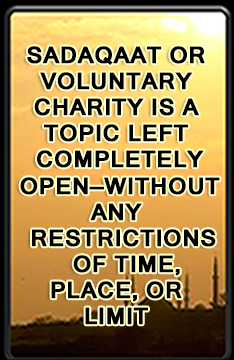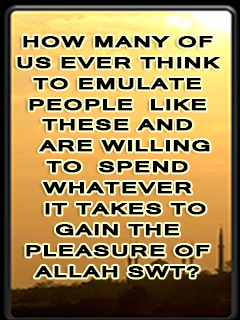|
|||||||||||||||||||||

|
|||||||||||||||||||||
|
|
|||||||||||||||||||||
|
|
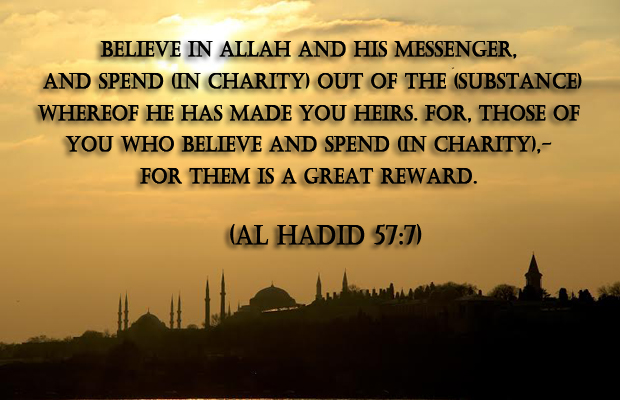 ZAKAH AND SPENDING    Zakah or charity is the third pillar of Islam and an obligation on every financially able Muslim. It is as fundamental requirement of being a Muslim as salah (prayer). In order to show us the significance of zakah Allah SWT has combined these two pillars approximately 82 times in the Qur’an.  Truly he succeeds that purifies it (Ash-Shams 91:9)  By men whom neither traffic nor merchandise can divert from the Remembrance of Allah, nor from regular Prayer, nor from the practice of regular Charity: Their (only) fear is for the Day when hearts and eyes will be transformed (in a world wholly new) (An-Noor 24:37)  Those who establish regular prayers and give in regular charity, and also have (full) assurance of the hereafter. (An-Naml 27:3)
In here I will share with you an understanding which is a lot deeper and more profound than just fulfilling an obligation. There are two topics in the Qur’an that have been left open without any cap or limit. These are dhikrullah (remembrance of Allah) and spending. There are many wisdom behind Allah SWT not setting a limit on these, one of which is to challenge our sincerity and devotion to Him SWT. He SWT throughout the Qur’an encouraged, advised, and advertised this practice, and then left it open without a limit as a challenge to our faith.   In the Qur’an Allah SWT commands us of zakah or charity. There is zakat-ul-mal which is 2.5% of the annual net income left yearly in liquid cash. Then there is zakah over gold, property, crops etc. This matter can be investigated according to what a person has by asking a scholar proficient in this issue. This is an obligatory act which must be performed once a year. In this article our aim is to encourage and educate you about the importance and significance of this issue; not to tell you how to do it. The amount of zakah differs for each individual and should be calculated by a knowledgeable person according to the person’s wealth.   Zakat-ul-fitr is the approximate amount of a meal per person. This is also an obligation which must be paid before Salat-ul-Eid at the end of Ramadan to the needy Muslims. It should be paid in advance as the money should reach the needy people before Salat-ul-Eid. This amount is calculated by the country or region according to the status of the family and must be paid for every member of the family. Every member of the family earning an income is responsible to pay his own zakah; and the head of the household is responsible to pay the zakah for all those members of the family who do not earn an income.   Zakah is an obligation and requirement of being a Muslim whereas spending is a voluntary act. InshaAllah, in this article I will introduce you to the many terms for the act of spending that Allah SWT used in the Qur’an; as well as the difference between spending and obligatory charity. Spending other than zakah is to show Allah SWT, through actions, the amount of our belief, love, devotion and willingness to sacrifice voluntarily for His pleasure. We have the exalted examples of Prophet SAW, his beloved first wife Khadeeja (RA) and his closest companion AbuBakr (RA) who spent all that they had for Allah SWT’s pleasure.
In Islam we have actions which have to be done—no excuses; among these are the five pillars of Islam. After that there are actions which Allah SWT wants to see from His slaves as a proof of their sincerity to Him. These include the things most beloved to us: our self (love), our time and our money.   Sadaqaat or voluntary charity is a topic left completely open—without any restrictions of time, place, or limit. When you carefully read the verses of the Qur’an and the ahadeeth, you will find that the reward of sadaqaat depends on three elements:
 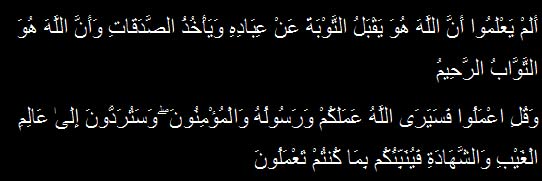 Take, [O, Muhammad], from their wealth a charity by which you purify them and cause them increase, and invoke [ Allah 's blessings] upon them. Indeed, your invocations are reassurance for them. And Allah is Hearing and Knowing. Do they not know that it is Allah who accepts repentance from His servants and receives charities and that it is Allah who is the Accepting of repentance, the Merciful? And say, "Do [as you will], for Allah will see your deeds, and [so, will] His Messenger and the believers. And you will be returned to the Knower of the unseen and the witnessed, and He will inform you of what you used to do." (At Tawba 9:103-105)  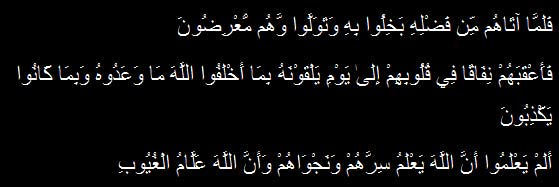 Amongst them are men who made a covenant with Allah, that if He bestowed on them of His bounty, they would give (largely) in charity, and be truly amongst those who are righteous. But when He did bestow of His bounty, they became covetous, and turned back (from their covenant), averse (from its fulfillment). So He has put as a consequence hypocrisy into their hearts, (to last) till the Day, whereon they shall meet Him: because they broke their covenant with Allah, and because they lied (again and again). Know they not that Allah doth know their secret (thoughts) and their secret counsels, and that Allah knows well all things unseen? (At Tawba 9:75-78)  If you disclose your charitable expenditures, they are good; but if you conceal them and give them to the poor, it is better for you, and He will remove from you some of your misdeeds [thereby]. And Allah , with what you do, is [fully] Acquainted. (Al Baqarah 2:271)    Alms are for the poor and the needy, and those employed to administer the (funds); for those whose hearts have been (recently) reconciled (to Truth); for those in bondage and in debt; in the cause of Allah; and for the wayfarer: (thus is it) ordained by Allah, and Allah is full of knowledge and wisdom. (At Tawba 9:60)   Infaaq is another term often repeated in the Qur’an for spending. Allah SWT has left it just like that—spending.  By no means shall you attain righteousness unless you give (freely) of that which you love; and whatever you give, of a truth Allah knows it well. (Aal Imran 3:92) Some scholars consider this verse to be the pathway of reaching goodness with Allah SWT. The key word in here is to spend of what you love—not what you have. Make sure you get it right. Read it repeatedly and do not read it so quickly that you overlook the key point! He SWT gives many examples of this spending in the Qur’an:  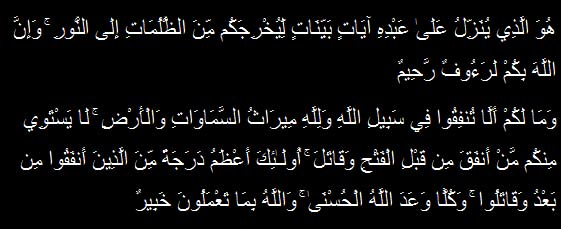 Believe in Allah and His messenger, and spend (in charity) out of the (substance) whereof He has made you heirs. For, those of you who believe and spend (in charity),- for them is a great Reward. What cause have you why you should not believe in Allah?- and the Messenger invites you to believe in your Lord, and has indeed taken your Covenant, if you are men of Faith. He is the One Who sends to His Servant Manifest Signs, that He may lead you from the depths of Darkness into the Light and verily Allah is to you most kind and Merciful. And what cause have you why you should not spend in the cause of Allah?- For to Allah belongs the heritage of the heavens and the earth. Not equal among you are those who spent (freely) and fought, before the Victory, (with those who did so later). Those are higher in rank than those who spent (freely) and fought afterwards. But to all has Allah promised a goodly (reward). And Allah is well acquainted with all that you do. (Al Hadid 57:7-10) Today, a lot of so called Muslims quote portion of this verse and use it with their own corrupt interpretation and wrong understanding:  "And spend in the Path of Allah, and do not contribute to your own destruction" (Al Baqarah 2:195) Aslam ibn `Imran narrated that when they were fighting the Romans, a Muslim soldier penetrated the enemy ranks. People quoted the above verse saying, "SubhanAllah! He has contributed to his own destruction." Thereupon, Abu Ayyub al-Ansari (RA) stood up, and said, "O people! You give this interpretation to this verse, whereas it was revealed concerning us, the Ansar, when Allah had given honor to Islam and its supporters had become many, whereupon some of us secretly said to one another … "Our wealth has been depleted, and Allah has given honor to Islam and its supporters have become many, so let us stay amidst our wealth and make up what has been depleted of it. Then some of us started delaying in spending for Allah."  "And spend in the Path of Allah, and do not contribute to your own destruction" (Al Baqarah 2:195) We the Ansar believed that Allah SWT revealed this verse for us refuting what we had said and warning us that if we delay in spending we will bring destruction to ourselves.  O you who believe! Spend out of (the bounties) We have provided for you, before the Day comes when no bargaining (Will avail), nor friendship nor intercession. Those who reject Faith they are the wrong-doers. (Al Baqarah 2:254) Abdullah Ibn Mas’ud RA states that when this verse was revealed we cried and were so scared that this was revealed as a warning for us when we delayed in spending:  Has not the Time arrived for the Believers that their hearts in all humility should engage in the remembrance of Allah and of the Truth which has been revealed (to them), and that they should not become like those to whom was given Revelation aforetime, but long ages passed over them and their hearts grew hard? For many among them are rebellious transgressors. (Al Hadid 57:16)  Those who spend (freely), whether in prosperity, or in adversity; who restrain anger, and pardon (all) men;- for Allah loves those who do good;- (Aal Imran 3:134)  And whatever you spend in charity or devotion, be sure Allah knows it all. But the wrong-doers have no helpers. (Al Baqarah 2:270)  It is not required of you (O Messenger), to set them on the right path, but Allah sets on the right path whom He pleases. Whatever of good you give benefits your own souls, and you shall only do so seeking the "Face" of Allah. Whatever good you give, shall be rendered back to you, and you shall not be dealt with unjustly. (Al Baqarah 2:272)  Those who (in charity) spend of their goods by night and by day, in secret and in public, have their reward with their Lord: on them shall be no fear, nor shall they grieve. (Al Baqarah 2:274)  O you who believe! Give of the good things which you have (honorably) earned, and of the fruits of the earth which We have produced for you, and do not even aim at getting anything which is bad, in order that out of it you may give away something, when you yourselves would not receive it except with closed eyes. And know that Allah is Free of all wants, and worthy of all praise. (Al Baqarah 2:267)  The example of those who spend their wealth in the way of Allah is like a seed [of grain] which grows seven spikes; in each spike is a hundred grains. And Allah multiplies [His reward] for whom He wills. And Allah is all-Encompassing and Knowing. (Al Baqarah 2:261)  O you who have believed, do not invalidate your charities with reminders or injury as does one who spends his wealth [only] to be seen by the people and does not believe in Allah and the Last Day. His example is like that of a [large] smooth stone upon which is dust and is hit by a downpour that leaves it bare. They are unable [to keep] anything of what they have earned. And Allah does not guide the disbelieving people. (Al Baqarah 2:264)  And spend [in the way of Allah ] from what We have provided you before death approaches one of you and he says, "My Lord, if only You would delay me for a brief term so I would give charity and be among the righteous." (Al Munafiqoon 63:10)   Qard means loan. Imagine the Creator asking His own servant to give Him a loan! A loan guarantees return of the money. And who is the one promising to pay back? Allah SWT Himself! When I was young, I heard a scholar say, Allah SWT created all people with different weaknesses and dispositions. If you are not generous and tend to love your money, Allah SWT does not tell you to give it up, instead He asks for a loan and promises to pay you back. If you study this topic in depth and study the lives of the companions and what they did, it will make you cry. Instead of going into details, I want to make this an eye opener only and expose you to the importance and beauty of this practice that is repeatedly encouraged by Allah SWT and His Prophet SAW  Who is he that will Loan to Allah a beautiful loan? for (Allah) will increase it manifold to his credit, and he will have (besides) a liberal Reward. (Al Hadid 57:11)  For those who give in Charity, men and women, and loan to Allah a Beautiful Loan, it shall be increased manifold (to their credit), and they shall have (besides) a liberal reward. (Al Hadid 57:18  If you loan Allah a goodly loan, He will multiply it for you and forgive you. And Allah is Most Appreciative and Forbearing. (At-Taghabun 64:17)   Allah SWT used the term bargain or trade for spending. Bargain or trade for what? According to the explanation (tafsir) of the following verses, the scholars consider them to be the key of saving one from the torture of the grave along with the victory in life, and gaining the highest level in jannah. Imagine bargaining temporary, fleeting material life for the everlasting joys of hereafter. Therefore if you want purification from the torture of the grave, victory as an individual or an ummah, and elevation to the highest level in paradise, here is your chance. This is the bargain! Read the verses and study their tafsir really well. If you live the condition, you will get the bargain! 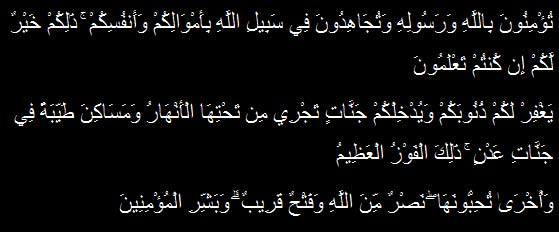 That you believe in Allah and His Messenger, and that you strive (your utmost) in the Cause of Allah, with your property and your persons: That will be best for you, if you but knew! He will forgive you your sins, and admit you to Gardens beneath which Rivers flow, and to beautiful mansions in Gardens of Eternity: that is indeed the Supreme Achievement. And another (favor will He bestow,) which you do love-help from Allah and a speedy victory. So give the glad tidings to the believers. (As-Saff 61:11-13)   Allah SWT used the word ‘purchase’ saying… “Allah has purchased from the believers their persons and their goods.” It is already done! The business has been concluded and it is up to you to deliver the merchandise. You deliver; Allah SWT will deliver!  Indeed, Allah has purchased from the believers their lives and their properties [in exchange] for that they will have Paradise. (At Tawba 9:111)   Suhayb Ar-Rumi (RA) was a companion of the Prophet SAW who embraced Islam early on in Makkah and was quite wealthy. When he intended to migrate to Medina, the enemy tried to prevent him and attempted to capture him. He bargained with them and offered all his wealth in return of them letting him go. They agreed and Suhayb (RA) arrived in Medina—penniless yet elated to be back in the company of the Prophet SAW and the believers.
 And of the people is he who sells himself, seeking means to the approval of Allah. And Allah is kind to [His] servants. (Al-Baqarah, 2:2O7) How many of us ever think to emulate people like these and are willing to spend whatever it takes to gain the pleasure of Allah SWT?   Ithaar is one of the highest levels of spending and it refers to spending the most precious thing, from the only thing that you have and that you need. Imagine giving away what you desperately need for yourself to others just to please Allah SWT. Islamic history is full of examples of ithaar by those yearning to gain the pleasure of Allah SWT. Abu Hurayrah (RA) related that once Messenger of Allah SAW entrusted one of the companion of the Platform (al-Suffah) to a man from the Helpers (Ansar). {According to a narration it was Abu Talha Ansari RA.} The latter took the former to his family and asked his wife: “Do we have anything [to feed him]?” She said: “We do not have anything except the children’s food”. He said: “Put them to sleep and then bring me the food. And when you put the food down, dim the light and let us pretend to be eating with him so the guest will not feel shy until he finishes his meal.” She did as her husband requested. The Helper offered what he had to his guest. The following morning he took him back to the Messenger of Allah SAW. The Prophet SAW said: “Indeed, the dwellers of the heavens are amazed at what you two have done”. This verse was then revealed:  And [also for] those who were settled in al-Medina and [adopted] the faith before them. They love those who emigrated to them and find not any want in their breasts of what the emigrants were given but give [them] preference over themselves, even though they are in privation. And whoever is protected from the stinginess of his soul - it is those who will be the successful. (Al Hashr 59:9) They gave up what was most essential for them—food for their children, and became the role model of ultimate sacrifice. This verse is not only for them, rather for all who do the same.   |
||||||||||||||||||||


